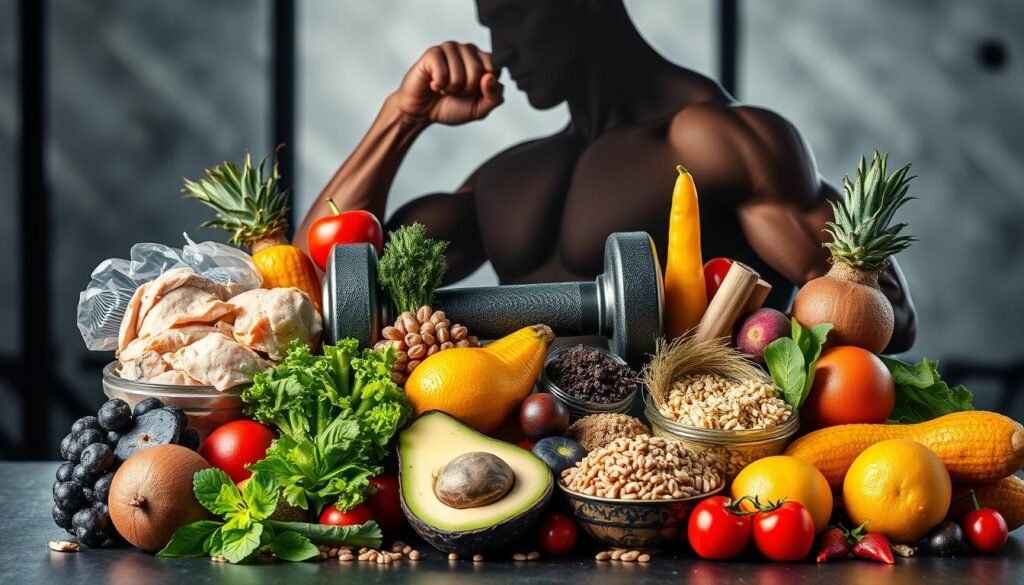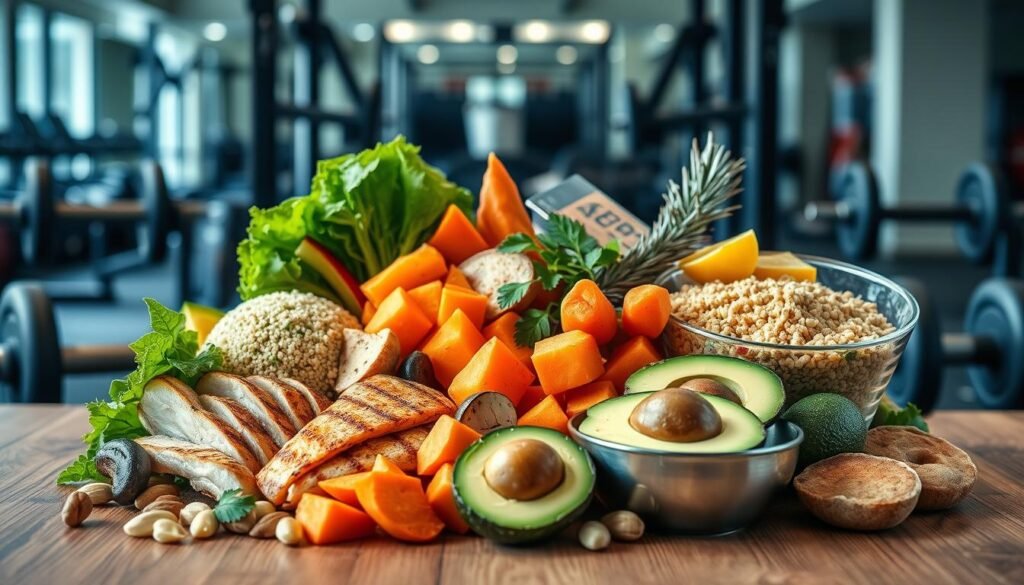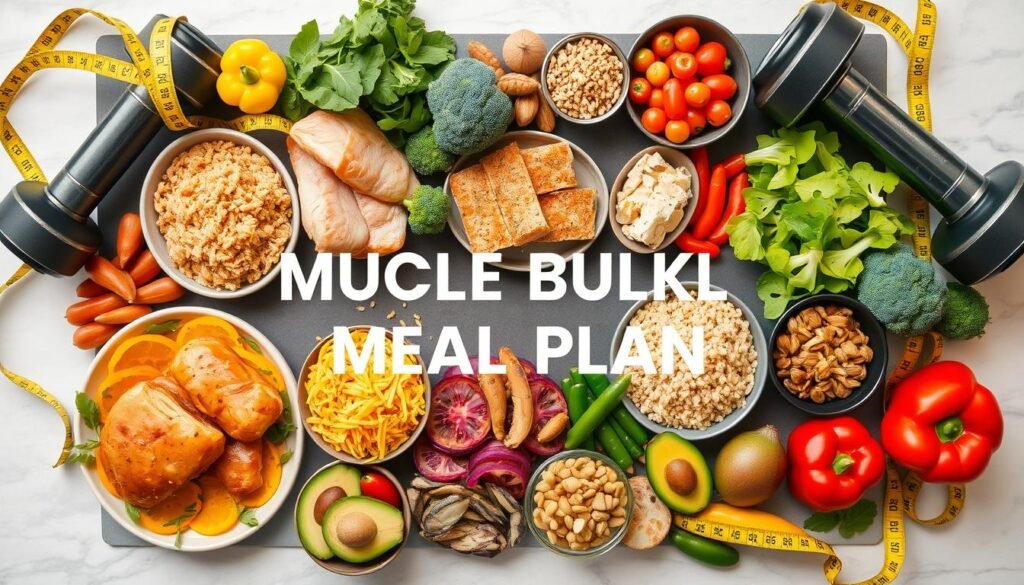Have you thought that eating right is as crucial as lifting weights? Nutrition is key in muscle bulking. By understanding muscle building nutrition, you can boost your muscle gains.
The right food plans set the stage for muscle growth and healing. This matters a lot.
Let’s dive into what it takes to bulk up effectively. We’re talking about calories, macronutrients, and meal plans. Getting your daily calories and balancing proteins, carbs, and fats is vital. Every detail helps you reach the body you want.
For deeper insights into nutrition and muscle building, check out this comprehensive nutrition advice.
Key Takeaways
- Understanding nutrition is fundamental in the muscle bulking process.
- Caloric surplus is essential for muscle growth.
- The right macronutrient balance fuels muscle development.
- Meal planning is crucial for sustaining energy levels during workouts.
- Proper dietary choices contribute to optimal recovery and muscle hypertrophy.
Understanding Muscle Bulking
To understand muscle bulking, it’s important to grasp some key concepts. Bulking is a phase in your fitness journey where you aim to gain muscle. You do this through specific diets and workouts. The process of gaining muscle can be tricky. Yet, with the right strategies, you can see great progress.
There are two main ways to bulk up: clean and dirty bulking. Clean bulking means eating healthy foods that help you gain muscle without too much fat. Dirty bulking is less strict. It lets you eat more calories, even from less healthy foods. The best method depends on what works for you and your body’s needs.
Muscle fibers are important in bulking up. There are different types, and each has its own job. Fast-twitch fibers help with power and growth. Slow-twitch fibers are good for endurance. Knowing about these can help you plan your workouts to match your bulking goals.
Recovery is also key to gaining muscle. Your body needs to fix and build muscle after hard workouts. Taking enough rest and eating well, especially protein, helps with this. It makes your muscles grow stronger.
Nutrition is more than just food. It helps your performance too. Eating the right foods at the right times, balancing nutrients, and staying hydrated boosts your training. This strategic approach can help you make lasting gains. So, understanding how to bulk up is crucial for fitness success.
The Importance of Nutrition in Muscle Building
Understanding nutrition’s role is key for building muscle. Eating right helps muscle growth and boosts athletic performance. Both pros and weekend athletes need to focus on nutrition for athletes.
Eating protein and carbs at the right time helps muscles grow and recover. It means better results from your workouts. The way you spread out protein during the day matters too.
A diet aimed at muscle building nutrition makes a big difference. It should have lots of good protein, healthy fats, and carbs. This mix fuels your workouts, helps you recover, and makes muscles grow.

| Nutritional Aspect | Benefits |
|---|---|
| Protein Intake | Supports muscle hypertrophy and recovery |
| Carbohydrates | Provides energy for workouts and aids glycogen replenishment |
| Healthy Fats | Essential for hormone production and overall health |
Adding these nutrients to your diet can really help with building muscle and reaching your fitness goals.
Essential Nutrition Education for Effective Muscle Bulking
Understanding nutrition is key for effective muscle building. A good diet for muscle gain is not just about eating enough protein. It also requires balancing carbs, fats, and calories to maximize growth.
Components of a Muscle Gain Diet Plan
To build a muscle gain diet, include several important foods:
- Protein: Essential for fixing and growing muscles. Choose chicken, fish, beans, and legumes.
- Carbohydrates: Important for energy during workouts and help with recovery. Eat whole grains, fruits, and vegetables.
- Fats: Good fats, like those in avocados, nuts, and olive oil, provide energy and keep you healthy.
Caloric Surplus: The Key to Muscle Growth
To grow muscle, you need a caloric surplus. This means eating more calories than you burn. This extra energy helps build muscle mass. Learning the right way to eat for bulking is important. A good nutrition education can guide you on how many calories you need, based on your activities and goals.
| Stage | Macronutrient Ratio | Focus |
|---|---|---|
| Bulking | 40% Carbs, 30% Protein, 30% Fats | Gain muscle mass |
| Cutting | 40% Protein, 40% Carbs, 20% Fats | Preserve muscle and reduce fat |
Macronutrients for Muscle Building
Understanding macronutrients is key for those wanting to boost their fitness. Macronutrients include carbohydrates, proteins, and fats. Each one has a special role in building muscles and keeping you healthy.
Role of Carbohydrates in Energy Supply
Carbohydrates are essential for energy during workouts. They’re the main fuel for intense exercise. Eating whole grains and fruits helps keep energy up while working out. This helps you recover quicker after exercising.
Protein Intake for Muscle Growth: How Much Is Enough?
Proteins are crucial for repairing tissues and building muscles. How much you need depends on your fitness goals and how active you are. Getting protein from both animal and plant sources helps grow muscles. It’s important to eat the right amount. Looking at resources can help plan a diet that meets protein needs. For extra tips, you can read a guide on reaching muscle-building goals.
Fats: The Unsung Heroes of Nutrition
Healthy fats are key, yet often ignored, in muscle nutrition. They help produce hormones and keep you healthy, which is important for muscle growth. Adding foods like avocados, nuts, and olive oil to your diet is good for your health and muscles.

| Macronutrient | Primary Function | Best Sources |
|---|---|---|
| Carbohydrates | Energy supply for workouts | Whole grains, fruits, vegetables |
| Proteins | Muscle repair and growth | Chicken, fish, legumes, dairy |
| Fats | Hormone production and health | Nuts, seeds, oils, avocados |
Adding these macronutrients to your daily meals is important for building muscles. A balanced diet with carbohydrates, proteins, and fats improves performance and recovery. This leads to better muscle growth.
Creating an Effective Muscle Bulking Meal Plan
Designing a meal plan for muscle growth needs careful thought. It’s about balancing what and when you eat to build muscle. Here are some examples of daily and weekly meal plans. Plus, tips on when to eat for the best results.
Sample Daily and Weekly Meal Plans
Diverse and nutrient-rich foods are key for a muscle-building meal plan. Consider this daily eating schedule as a starting point:
| Meal | Time | Food Items |
|---|---|---|
| Breakfast | 8:00 AM | Oatmeal with protein powder, almond butter, and banana |
| Snack | 10:30 AM | Greek yogurt with mixed berries and honey |
| Lunch | 12:30 PM | Grilled chicken, quinoa, steamed broccoli |
| Snack | 3:00 PM | Protein shake and a handful of almonds |
| Dinner | 6:00 PM | Salmon, sweet potato, and asparagus |
| Evening Snack | 8:30 PM | Cottage cheese with pineapple |
Meal Timing: When to Eat for Maximum Gains
When you eat is just as important as what you eat for muscle growth. Here are three tips to make your eating plan work harder:
- Pre-workout Nutrition: Eat carbs and protein 30-60 minutes before working out to boost energy.
- Post-workout Recovery: Have a protein-rich meal within 30 minutes after your workout to help muscles recover.
- Consistent Meal Schedule: Regular meals and snacks every 3-4 hours ensure a constant supply of nutrients.

Key Muscle Building Tips for Success
Success in muscle building is not just about weight lifting. It involves a plan that includes good eating and rest. Knowing how to mix strength training and food is key. It helps you grow muscles and stay healthy.
Combining Strength Training with Nutrition
It’s important to mix strength training and the right food. This mix gives your body what it needs for good workouts. Here are some important muscle building tips:
- Prioritize protein intake: Eat a diet with plenty of protein to help build muscle.
- Implement a caloric surplus: Eat more calories than you burn to help your muscles grow.
- Hydration is essential: Drinking enough water can help your performance and recovery.
The Importance of Recovery and Nutrition
Rest is crucial for building muscle. It gives your muscles a chance to repair and get stronger. When you combine rest and the right food, you boost your results. Here are some key things to think about:
- Plan recovery days: Make sure to take breaks so your muscles can heal.
- Focus on post-workout nutrition: Eat proteins and carbs after exercise to recover faster.
- Listen to your body: Be aware of fatigue or overtraining and adjust your routine as needed.
Using these strategies can help with muscle growth. They offer a complete approach to fitness. This includes proper training, eating well, and resting. By focusing on these, you can make the most of your muscle-building efforts.
Muscle Building Supplements: Do They Work?
Muscle building supplements are key in many fitness plans. There are many popular supplements to choose from. This can be hard for those wanting to grow muscle. Knowing how these products work and their safety can help you achieve the best results.
Overview of Popular Muscle Building Supplements
Some of the top muscle building supplements include:
- Whey Protein: Provides high-quality protein for quick absorption. It helps with muscle recovery and growth.
- Creatine: It boosts strength, endurance, and energy during hard workouts.
- Branched-Chain Amino Acids (BCAAs): They are key in protein synthesis and muscle repair.
- Beta-Alanine: Increases endurance and reduces tiredness to promote longer exercise sessions.
These supplements each have unique benefits. They can help greatly with a muscle-building plan.
Natural vs. Synthetic Supplements: What to Choose?
The choice between natural vs. synthetic supplements can confuse many. Natural supplements are made from whole foods. They focus on minimal processing. Synthetic ones are very efficient but have artificial ingredients. It’s important to check their long-term use effects.
| Type | Source | Examples | Advantages |
|---|---|---|---|
| Natural | Whole foods | Whey protein isolate, plant-based protein | Fewer additives, holistic benefits |
| Synthetic | Chemically formulated | Creatine monohydrate, synthetic BCAAs | Specific benefits, often stronger |
Muscle Building Recipes for Easy Meal Prep
Starting a muscle bulking journey is exciting. Having a lot of high-protein meal prep ideas is key. With the best muscle building recipes, it’s easy to eat nutrient-rich foods. These help you fuel up for your workouts and recovery. These recipes help muscles grow and are great to taste. This makes meal prep fun, not just another task.
Diverse and Delicious High-Protein Recipes
The meal ideas we have are easy and quick, great for busy people. Take a quinoa and black bean salad, for example. It’s full of protein and fiber. Or try a chicken stir-fry with lots of vegetables for lean protein. Adding fish like salmon or tuna adds healthy fats but keeps the protein high.
Planning high-protein meals ahead means you won’t get bored. Keep snacks like Greek yogurt with berries or homemade protein bars ready. These are quick energy boosts. With these simple recipes, you can focus on your fitness goals. And you’ll enjoy your diet too.